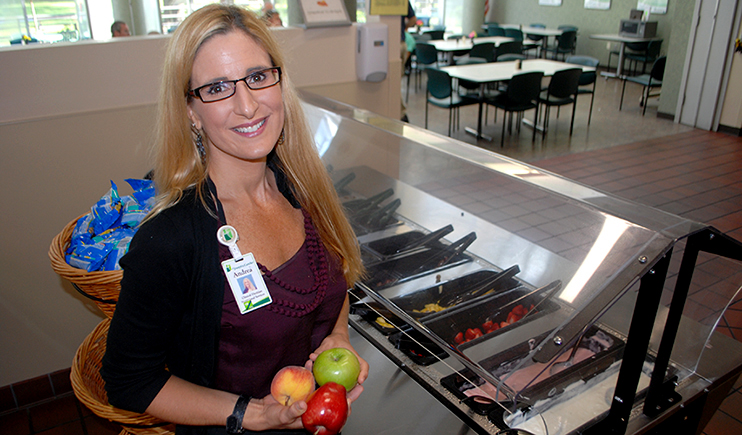Is a vegetarian diet better for you?
Nutrition
Is a vegetarian diet better for you? That’s not a simple yes or no question.
Vegetarian diets can be very unhealthy if you aren’t careful. A diet that is high in fat and carbohydrates isn’t necessarily going to be better for you than lean meats and fish.
However, following a vegetarian diet that is a healthy combination of colorful vegetables, fruits and non-animal proteins has many health benefits. According to an evidence-based review by the Academy of Nutrition and Dietetics, a vegetarian diet is associated with lower risk of death from heart disease, lower cholesterol levels, lower blood pressure and lower rates of hypertension and type 2 diabetes. Vegetarians also tend to weigh less and have less risk of developing cancer and other chronic diseases.
Again, it’s really all about what – and how much – you consume.

St. Joseph’s Hospital Clinical Dietitian Andrea Manley has been meat-free since she was in seventh grade. While she admittedly started out eating only soft pretzels, years of education and experience make her an expert voice for vegetarians.
Types of vegetarian diets
A vegetarian diet is a plant-based diet free of animal products and animal protein. There are many different types of vegetarian diets, Manley says. The most common are lacto-ovo and vegan.
Lacto-ovo vegetarians do not consume any animal product or protein, but do eat animal byproducts, such as eggs, cheese and other dairy items. Vegans do not eat any animal product at all. Manley is a vegan.
There also are pescatarians, which follow a vegetarian diet but choose to eat seafood.
The right combination to live a healthy, vegetarian lifestyle
“Our body needs all kinds of different nutrients,” says Manley. “It needs the protein to build the muscle. It needs carbohydrates to feed muscle, and it needs fiber to keep your GI tract clean.”
Vegetarians also need to be conscious of their iron, calcium and Vitamins D and B12 intake.
Protein builds and repairs tissues. It helps with healing and fighting disease. Vegetarians need to make effort to include enough protein in their diet after giving up animal protein.
Manley suggests tofu, beans, nuts, nut butters, soy and soy products. Regarding soy, she recommends whole soy products, such as edamame, soy milk and soy nuts, instead of processed soy products, such as the Morningstar or Boca brands. Other sources of protein for vegans or lacto-ovo vegetarians include tempeh, eggs, Greek yogurt, and certain green, leafy vegetables such as kale or Swiss chard.
Manley encourages a vegetable-heavy diet because “there are so many health benefits to vegetables,” she says. “The colorful vegetables have different vitamins and minerals, depending on the vegetable. Vitamins and minerals help fight cancer. They also improve heart health because you are not eating a lot of saturated fat.”
Swiss chard is among one of the best leafy, green vegetables to consume because it’s full of different vitamins and minerals, Manley says. She also recommends collard greens and spinach. Orange vegetables are a good source of beta carotene, which is good for your eyes. Also good for your sight and especially for fighting cancer is lycopene, which is found in tomatoes. Deep purple vegetables contain polyphenols which help keep the heart healthy. Broccoli and cauliflower help prevent colon cancer and also are high in fiber.
Again, it’s about how you prepare meals. Eating more fruits and vegetables and less potatoes, rice and pasta may be beneficial if you are trying to lose or maintain weight because starches are higher in calories than vegetables and lean proteins.
“However, for energy, our bodies do need complex carbohydrates, especially if we are exercising,” Manley says. “It may be best to monitor your portions of complex carbohydrates because if we eat too much it may exceed our calorie needs over the course of the day.”
Complex carbohydrates that Manley suggests to incorporate into your diet include potatoes, brown rice, quinoa, couscous, whole wheat pasta, beans, legumes and oatmeal. These carbs are good for you because they contain macro and micro nutrients and fiber for digestion.
“Just don’t binge on complex carbs because this will exceed your calorie needs and cause weight gain.”
Manley also says to avoid simple carbohydrates such as candy, doughnuts, cakes and cookies because there is no benefit other than excess calorie intake.
Transitioning into a vegetarian diet
If you want to start a vegetarian diet, Manley suggests going into it slow.
“If you eat meat at every meal, start by just eating meat once a day,” she says, “and then change it to three times a week and further on.”
To limit and eventually eliminate meat in your diet, Manley says to incorporate more fish or eggs or egg whites instead of meat. She also says not to be fearful of slowly adding different vegetables, fruits, legumes, nuts and seeds into your diet. Her favorites: edamame, tofu and seeds.
If you have questions about becoming a vegetarian, talk to your primary care doctor. He or she also can refer an outpatient dietitian to speak to.
Manley also recommends doing a lot of research by reading books and websites and talking to friends or family that you know are vegetarians. Websites she likes include nutrition411.com and eatright.org.
“Slowly ease into it. Don’t try (to become vegetarian) cold turkey,” Manley said. “Sooner or later you will get rid of that meat taste in your mouth.”
Should vegetarians take a supplement?
Yes, says Manley. She highly recommends vegetarians take a daily calcium supplement, especially vegans or those that also do not consume milk. She also recommends a multi-vitamin. She says to take half a one a day or one a few times a week.